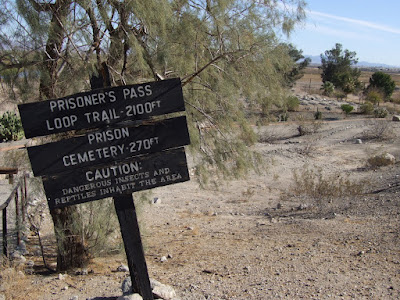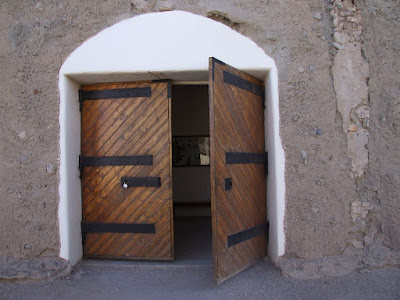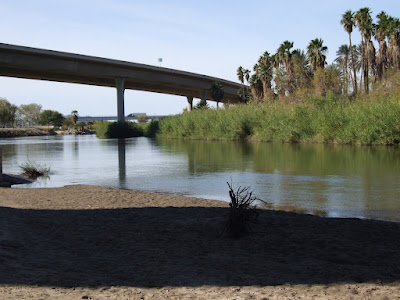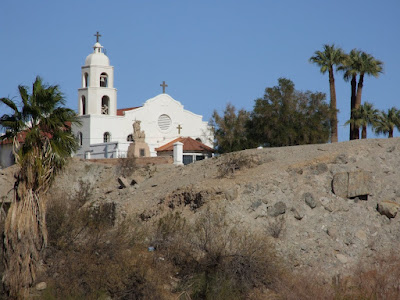Tuesday, April 16, 2024
Greylocks
Monday, March 09, 2015
Morning Walk in Grand Junction
Posted by
Skunkroot
at
12:40 AM
![]()
Labels: Daily Whiff, Daily Writing Exercise, Deep Skunk Thoughts, Grand Junction CO, Yuma
Wednesday, December 18, 2013
"Wintery Things" Fact # 1
A Primer for Yuman Children.
Snow really does slide off of roofs in giant clumps that will break apart on your head and leave you covered in snow. This occurrence isn't just some exaggerational fiction depicted in holiday programs (that have nothing to do with your desert reality) to make you laugh, such as Charlie Brown and South Park. Go somewhere with a lot of snow. You will see that it is so.
Posted by
Skunkroot
at
9:39 AM
![]()
Labels: Arizona, Childhood, Daily Whiff, Deep Skunk Thoughts, Desert Living, Weather, Winter, Wintery Things, Yuma
Wednesday, December 07, 2011
Luke Tucker - A Pearl Harbor Day Tribute
For the first few months, I delivered my papers from a baby stroller, often pushing the stroller with one hand while playing a broken harmonica (which my dad had given to me when I was four) with the other. One day Luke gave me a sturdy, new Western Flyer wagon with high slatted wooden sides. It was waiting at his doorstep when I came by. He said that if I was going to be delivering papers, I needed a good wagon or a bike to do it right. For Christmas the next year, he bought me a chromatic harmonica. It was exactly like the one my dad had given me, except that this one was shiny and new, and all of its reeds were in tune. I was 10 years old, and life was good.
Over time, that familiar Sunday morning smell of alcohol disappeared, replaced by the pleasant aromas of bacon, sausage, strong coffee and maple syrup. The Three Stooges and The Little Rascals (already old classics by then) would be playing on his portable black and white television, which was connected by a flat cable to a tall, old-fashioned metal antenna outside. Canned audience laughter slid through the crack of the thin, cold aluminum trailer door as the sun began to peek over the eastern foothills.
Luke had long since met my mom, who correctly surmised that he was a harmless, likeable old man. One day, he asked her if it would be o.k. to have me over for breakfast some mornings after my route. Those old Sunday morning programs had always been his favorites, he thought I might enjoy them, and he would be happy to have the company. Besides, he was already making breakfast anyway... She gave her permission, on the condition that I didn't stop at his place until after I had finished my morning deliveries.
From that day on, I would finish those Sunday papers by 6am. Then I would rush back to Luke's trailer park, wagon in tow, or riding the bike that I'd purchased with my paper route money. We'd sit and watch the hijinks of the Stooges and the goofy humor of the Rascals. We laughed and laughed at those corny episodes. We'd trade jokes too: the latest that I'd heard at school and his better, grittier versions from decades long past. Eventually, always - Luke would go outside and light up a cigar. He would look through the smoke, into the distance, in silence. For a few minutes he was somewhere far away, in some unreachable part of his mind. Sometimes I'd stand out in the cold with him, quietly hoping that he really didn't feel as alone in the world as he appeared.
It wasn't until a year or so later, when he was the subject of a full page write-up on Pearl Harbor Day in our local paper, that I learned that Luke Tucker, my Luke Tucker, was a Pearl Harbor vet. I was shocked. How could I not have known? I was excited to see him again, to ask about his experiences, and to hear his stories of adventure.
It was a weekday evening; Luke was on his patio. He was drinking. He had had too much. I don't remember now exactly how the conversation went, but he went off on me and called me names. I was so upset that my mother went to his place and gave him a piece of her mind. She told him that if he ever spoke that way to me again, that interaction would be our last. He was either going to treat me well, or our friendship would be over.
The next time I saw Luke, his eyes were smiling through slow, silent tears. He was so sorry for how he had acted. I said to him, "I was just surprised that you were a hero all this time and I never knew it. I just wanted to hear your side of the story. I'm proud to know someone like you." The tears began to stream, but his posture remained stoic. His gaze was fixed straight ahead, looking at nothing. Slowly and deliberately he said, "I'm no hero. You don't want to hear the stories that I have to tell, and I don't want to tell them. I lost a lot of friends in that war; they are the real heroes. It's because of them that you'll never have to know the things that I know."
His big, leathery hand clasped mine for the first and only time. He looked me straight in the eye, and told me that I deserved all the best that life had to offer. He said that he was thankful to know that a child of this generation could live with so much joy. "You are a good kid and I'm proud to be your friend." Then he asked me to please, never ask him about that war, ever again.
Posted by
Skunkroot
at
9:16 AM
![]()
Labels: Childhood, Daily Whiff, Deep Skunk Thoughts, History, Inspirational, Mentors, Military, Yuma
Wednesday, July 06, 2011
"Haboob" Hits Phoenix
It turns out that the term "haboob" is also from a very similar term in Arabic, but it is spelled with a different "H." While "haboob" is a term that I may have heard a couple of times to describe a very specific wind in the Sahara, I don't remember hearing it used to refer to dust storms in general before. It's always fun to find a new Arabic word being used in English. I will have to ask some of my friends who are native speakers of Arabic about the root word, which is "habb" (which has all sorts of meanings dealing with movement, one of which apparently is: "to gust," as in wind).
It's so interesting how even after so many years I can still find words that seem so basic, but which somehow haven't yet been placed into my memory banks. It seems that I often retain only the first word that I learned for a particular concept. After that, I get into the habit of using that word exclusively, and others that come up wind up being looked up in the dictionary many times before becoming a part of my repertoire.
In this case, the Arabic word that I've always used for wind is "rih, pl: riyah / arwah," which, interestingly enough, comes from same root as a common word for "soul" (not to mention the words for "fart," and conveniently enough "smell" and "odor" as well). A fascinating language indeed, and one whose nuances and connections never cease to fill me with wonder at its complexity and its beauty.
Posted by
Skunkroot
at
4:14 PM
![]()
Labels: Arabic, Daily Whiff, Links, Videos, Weird News, Yuma
Friday, January 29, 2010
Parting Wish - A tribute to Dr. Donald M. Tuttle, Ph.D - "Doc"
From the 1940's through the 1980's he hauled groups of school-age kids, in the back of his pickup truck every Saturday, through moist alfalfa fields, along the banks of the Colorado River, and into the wilds of the beautiful and still-wild Sonoran Desert.
Doc passed away three years ago yesterday. His continuing impact on the lives of generations of young boys and girls is simply beyond measure. Thank you Doc.
As life's winds blew; you fashioned me
Posted by
Skunkroot
at
5:41 PM
![]()
Labels: Daily Whiff, Deep Skunk Thoughts, Mentors, Nature, Poems, Yuma
Tuesday, January 19, 2010
Yuma Territorial Prison State Park

Chain Gang Prison Fund.





Chain Gang Prison Fund.
 The "new prison yard" which is, in my very humble opinion, not nearly as interesting as the older stuff...
The "new prison yard" which is, in my very humble opinion, not nearly as interesting as the older stuff...
 Fort Yuma played a historic if obscure role in the American Civil War. The saddle shown here and displayed in the Yuma Territorial Prison museum belonged to Lieutenant F. Green, M.D. who served with the Union Medical Corps at Fort Yuma during the war.
Fort Yuma played a historic if obscure role in the American Civil War. The saddle shown here and displayed in the Yuma Territorial Prison museum belonged to Lieutenant F. Green, M.D. who served with the Union Medical Corps at Fort Yuma during the war.Fort Yuma and the Civil War
 The view looking across the Colorado River to the California side,
The view looking across the Colorado River to the California side,where Fort Yuma originally stood.


Chain Gang Prison Fund.
Posted by
Skunkroot
at
1:15 AM
![]()
Labels: Childhood, Colorado River, Daily Whiff, History, Links, Outings, Pictures, Yuma
Views from the East Wetlands Park in Yuma
Posted by
Skunkroot
at
12:53 AM
![]()
Labels: Colorado River, Daily Whiff, Nature, Outings, Pictures, Yuma
Friday, January 08, 2010
Wednesday, August 05, 2009
Monday, October 20, 2008
Carpenter Bees
When I was a kid, I had a fascination with insects (and still do, as many of you probably already know). There was a neighbor down the street who was somewhat mysterious. I never could figure out what he did for a living, and it seemed like he was always at home. (This was strange in the working class neighborhood where I grew up.)
Sometimes he could be the nicest person ever, and other times he seemed be quite irritable (maybe he would say that my childhood self could, at times, be quite irritating). He and his wife had more tall trees in their yard than most of the other folks in our neighborhood, and this was a big deal in the town of Yuma, Arizona where I grew up. I also remember that he owned a sweet looking motorcycle, and had a red pickup truck with a camper on the back. He and his wife also owned a lot of finches.
Their driveway formed a semi-circle coming up to the front porch from the street. Just in front of the screened-in front porch, between the motorcycle and the truck, were two sections of a sawed up tree stump. Each one was a little over a foot and a half in diameter. One of them had bark and the other did not.
The stump that had the bark was home to a nest of carpenter bees. The bees lived there for years, peering cautiously out of their holes before lifting off loudly and lazily on their journeys. There were always a lot of black females around and a very few males. (The males are gold with green eyes.)
I remember trying to come up with ways to catch these guys. Usually a clear jar or a cup pressed against the sawed off trunk would work with a piece of plastic to make a flat lid once the bees were in the jar. These bees are very fierce and impressive. They are at least 4 times larger than a honeybee.
I can still feel the adrenaline rush that hit me every time I caught one of these insects, (or anything that could sting for that matter). These bees were so large that the beating of their wings would make the plastic cups vibrate like a cell phone (of course no one had cell phones back then).
Usually, especially after I turned 14, I would just watch my captured subject for a while and then let it go. After years of collecting insects to put into collections, I had decided that I didn't want to kill them anymore just to put them under glass. To this day I prefer to watch insects in the wild, doing what they do without any interference from me.
Posted by
Skunkroot
at
6:00 PM
![]()
Labels: Daily Whiff, Nature, Yuma
Saturday, January 26, 2008
Yuma Dome House




















































